Sebastian Vettel: Pressure mounting on error-prone Ferrari driver - Jolyon Palmer
- Published
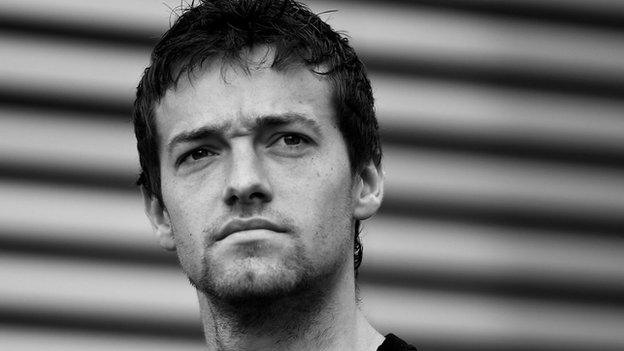
Former F1 driver Jolyon Palmer, who left Renault during the 2017 season, is part of the BBC team and offers insight and analysis from the point of view of the competitors
Sebastian Vettel's performance at the Bahrain Grand Prix has raised serious questions - about his series of unforced errors, about his status within Ferrari and about his claim to be a potential world champion this year.
A spin while battling with Lewis Hamilton and a weekend on which he was out-paced by his new team-mate were exactly what Vettel did not need just two races into the new season.
The German came into 2019 needing to bury memories of 2018, when Ferrari had the fastest car for much of the season. Vettel had it within his hands to win a fifth world title, but a series of errors cost him that chance.
A crash out of the lead in Germany, and spins in Italy, Japan and the United States all left a lot of doubts.
As such, Vettel would have welcomed the winter break by the time Abu Dhabi came around last November.
The off-season is the perfect time to get away from Formula 1 and the mental anguish it can sometimes bring.
The season is unrelenting - 21 races across five continents over nine months. Every day the drivers are at the track they are answering questions from the media, and that can be particularly tough when you are on a bad run, as Vettel was in 2018.
But just two races into 2019 and the very same questions will be asked once more, and this time they will be asked louder.
An 'amateur' error from a four-time champion
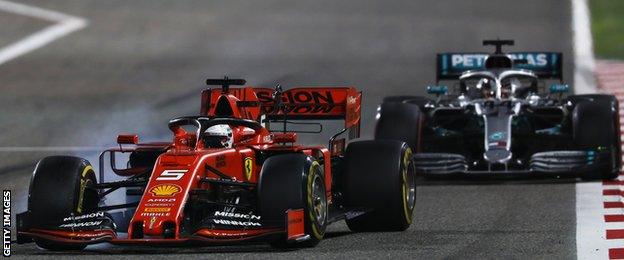
Vettel damaged his left rear tyre and front wing when he spun on lap 38 in Bahrain
Vettel's spin in the race in Bahrain was amateur.
Defending from Hamilton on the run up to Turn Four, Vettel did the right thing to cover the inside. But then Hamilton swept around him with a brilliant move, throwing caution to the wind by going so late on the brakes and attacking the corner with so much speed.
The move was done. Vettel then lit up the rear tyres, too heavy on the throttle on the exit and simply spun the car. He was clearly flustered by the Mercedes coming through and panicked.
The spin was different to his three at the back end of last year because this one was on the exit of the corner, rather than on the entry or at the apex with a car squeezing him from the outside. But the reason for it seems to be the same - panic in the heat of battle.
Conditions were tough. High winds play havoc with the balance of an F1 car. They make them so difficult and unpredictable to drive because the cars rely on having the perfect airflow to make the downforce work.
On top of that, in Bahrain the desert wind can blow sand onto the track. So not only is fluctuating downforce an issue but the track grip can reduce as well.
But this is a weak excuse for a spin of that simplicity. If a backmarker rookie had spun in the manner Vettel did, they would have been a laughing stock after the race. For a four-time world champion to do so should be unthinkable.
Mistakes happen, but this is now four spins in Vettel's past 10 races going back to Monza last year. That's clearly an unacceptable trend for a championship challenger.
Leclerc 'much better than a wingman'
'Leclerc has to be a title contender'
After a lacklustre opening weekend in Melbourne, Ferrari found their feet in Bahrain and had pace on the field all weekend long. But Vettel has another headache - his team-mate, Charles Leclerc.
Leclerc has stepped up to replace Kimi Raikkonen, who Vettel comfortably had the measure of during their four years together as Ferrari team-mates.
The feeling at Ferrari was that the 21-year-old from Monaco would probably still play second fiddle this year to Vettel, their lead driver and championship challenger for the past couple of years. That was emphasised with team orders to keep Leclerc behind Vettel in the closing stages of the Australian Grand Prix.
But in Bahrain Leclerc showed he is much better than a wingman driver. Pole position on Saturday by 0.3secs over his team-mate, and two laps that would have taken pole as well, show this was no flash in the pan.
Interestingly, Ferrari still tried to impose team orders in the race, once Vettel had passed Leclerc at the start. But Leclerc's pace was so much better he simply defied them. He caught his team-mate, passed him and pulled out a healthy advantage.
If Vettel was feeling some heat after qualifying, with Leclerc taking Ferrari's first pole of the year, he must have been feeling pretty awful after his team-mate breezed past around the outside of Turn One early in the race, despite Vettel's best attempts to keep him behind.
Leclerc then held Vettel off with ease as they got to Turn Four and disappeared up the road.
Can Vettel handle the pressure?
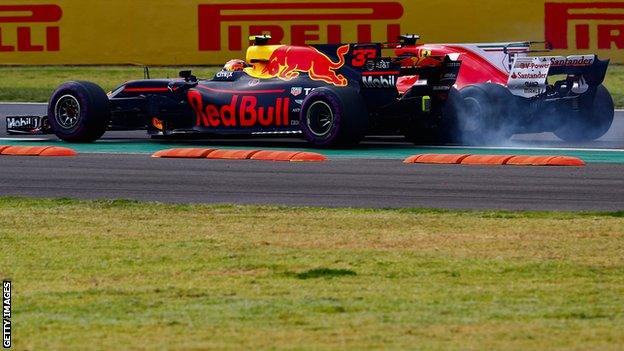
Max Verstappen is five points ahead of Vettel in the 2019 drivers' championship
All of these factors add pressure on Vettel. Inside the car it can be lonely during a race. You are left alone with your thoughts for an hour and a half, in the pursuit of perfection, corner after corner, lap after lap. I'm sure Vettel was feeling immensely frustrated by the time he was fighting off Hamilton for second place.
One thing Vettel has not been able to do well since his Red Bull days is handle the pressure. This is a key flaw at the moment and one that played a big part in his failure to win a title in either 2017 and particularly 2018.
His new, fast team-mate and his Bahrain spin only amplify the pressures.
So where does he go from here?
He simply must get his head down and deliver consistently and not spin again for a very long time - all season, basically, if he wants to be champion by the final race in Abu Dhabi on 1 December.
That's easier said than done, because next time Vettel heads into wheel-to-wheel combat, with a car on his outside, he is sure to be wary of his mistakes. But if he's too cautious as a result he will be dead meat in the competitive front order.
As soon as you are seen as a soft touch, people will be even more elbows out, lunge at you from further back and get even more aggressive with you, taking risks they perhaps wouldn't otherwise.
Max Verstappen is an example for Vettel to follow. After six races last year, the Red Bull driver had had incidents in every single one, and the criticism and pressure were mounting, particularly after then team-mate Daniel Ricciardo's win in Monaco, while Verstappen had to start from the back after a crash in practice.
Verstappen has responded perfectly. He's so much more polished as a driver since then. He silenced the critics with his performances. He is still undeniably aggressive, as shown once more in Bahrain, but an element of control has entered his driving and he no longer faces the monotonous weekly scrutiny of the media.
Where do Ferrari go from here?
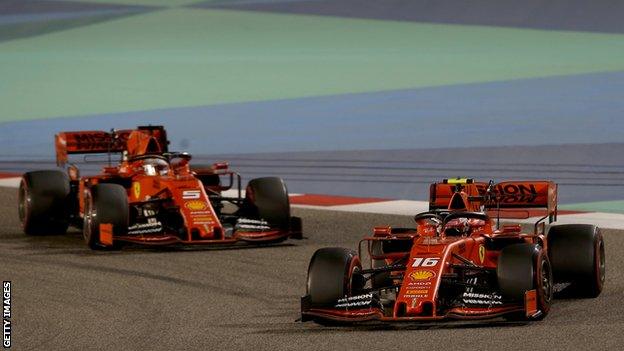
Ferrari have confirmed Leclerc will use the same engine in China as the one that cost him victory in Bahrain
As a team, Ferrari face an extremely interesting situation. The star driver has been outperformed by the young hot shoe, but let's not forget this is just one race.
Having said that, for Leclerc to look so good so early on is particularly impressive, even more so given how other drivers - such as Pierre Gasly at Red Bull and Daniel Ricciardo at Renault - have struggled to adapt to changing teams over the winter. Leclerc, by contrast, has taken it in his stride.
Ferrari don't need to do anything right now, but clearly it would be foolish to impose any more team orders while it is unclear who the stronger driver will be over the course of the season.
Crucially, the pace of the car was good in Bahrain, where they were a few tenths of a second ahead of Mercedes. So the main priority will be clawing back the points they have already lost to their German counterparts. But they have to make the most of their pace advantage now.
Leclerc should have won the race comfortably in Bahrain. Aside from a poor start, he drove the absolute perfect race. And being slow off the line allowed him to display his overtaking skills as well, as he scythed past Mercedes' Valtteri Bottas and Vettel with ease.
His engine letting him down in the closing stages will have hurt a lot, and you could hear the anguish over the team radio at the time. He should have had a first F1 win.
But after the race he was very accepting of it. Leclerc had had a number of laps to accept his fate, so the failure wasn't as raw as if it had been on the last lap. And yes, the double Renault retirement and subsequent safety car saved his maiden podium, making him "lucky in an unlucky situation", as he put it.
But this was a man who was justifiably happy with his weekend's work. He knew he had upset the apple cart in Bahrain. Even with an engine problem, he beat his team-mate with ease. The world was talking about him, Vettel was crumbling, and with Ferrari's pace advantage that first win will surely be around the corner.
- Published2 April 2019
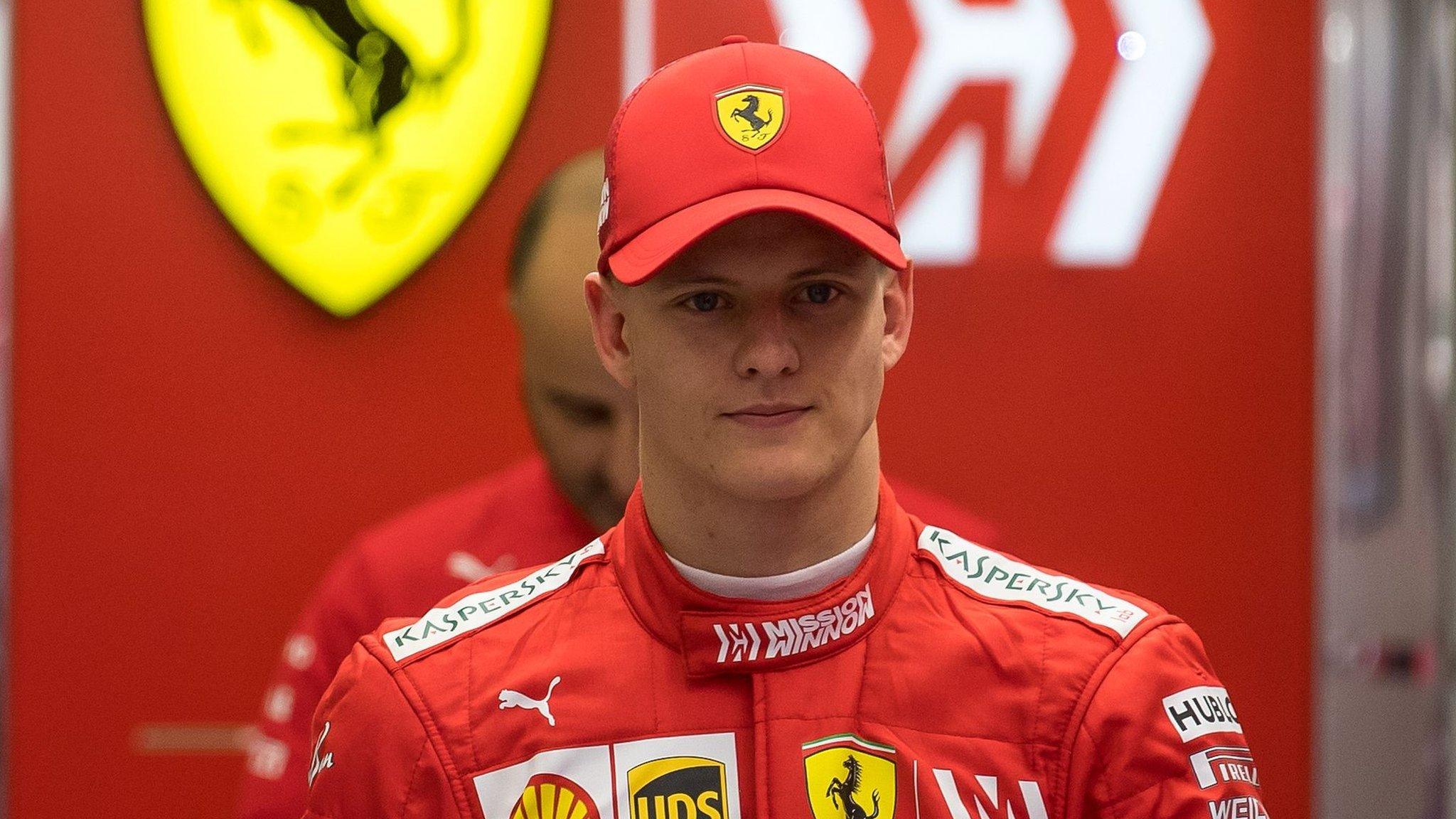
- Published2 April 2019